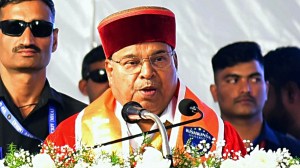Lost and Found
An ambitious novel about the fragility of family life told through immigrants striving to live the American dream
Ghana Must Go
Taiye Selasi
Viking
Rs 499
Pages: 318
An ambitious novel about the fragility of family life told through immigrants striving to live the American dream
There could well be a connection between the fact that even as Africa is becoming the new El Dorado for multinationals,corporate investors and fortune hunters,the continent is also emerging as a hothouse for literary talent. South Africa headed the list with heavyweights like Nobel Prize winners J.M. Coetzee and Nadine Gordimer but now it is countries like Nigeria and numerous others that are producing exciting,exceptional writers. Most share a similar background,either born in the West or those who went to America,UK or Europe to study and stayed on. That common immigrant experience coupled with their African roots has produced a unique literary voice and created some stars as well. Among them,Teju Cole,who was born in America,raised in Nigeria and moved back to New York; Chimamanda Ngozi Adichie,also of Nigerian origin; the delightfully named NoViolet Bulawayo from Zimbabwe,and now,Taiye Selasi whose debut novel has been bracketed with some exceptional publishing hype.
For a first-time author she had only published a short story earlier,Selasi has some impressive credentials. A graduate from Yale,she was doing her MPhil at Oxford where she met and was mentored by Nobel Laureate Toni Morrison. That connection resulted in her unfinished novel being snapped up by Penguin which ramped up the pre-launch publicity,including a glowing testimonial from Salman Rushdie,making Ghana Must Go one of the most eagerly anticipated novels of 2013. The inevitable question is whether it lives up to the hype. This is a hugely ambitious novel,following the saga of a disintegrating family in the US moving back to Africa to attend the funeral of the patriarch. The plot swivels between America and West Africa,two worlds that Selasi is familiar with,but only as a second-generation immigrant. She was born in London to Nigerian parents,moved to America and now resides in Rome. Fellow Nigerian Adichies recent novel was titled Americanah,a word Nigerians use for those who have left for the US and become Americanised.
That is not such a bad thing for an author,especially one of Selasis undoubted talent. Ghana Must Go is almost a lyrical journey that combines exceptional linguistic treatment with a moving story of a dysfunctional family trying to find its roots. Parts of the book read like lyrics of a song. Sample this.Later in the morning when the snow has started falling,and the man has finished dying,and a dog has smelled his death,Olu will walk in no particular hurry out of the hospital,hang up his BlackBerry,put down his coffee,and start to cry. There are plenty of such lyrical turns,perhaps too many,which dilutes much of the promise in the early chapters. The build up of characters is strong,starting with the father,Kweku Sai,and the impact his death has on those he leaves behind. His Nigerian wife Fola,his offspring,Olu,the twins Kehinde and Taiwo,and the last-born,Sadie. Selasis descriptive power and imagery turns them into a complex,combustible mix,a family of talented but flawed individuals who fall apart and then,with the fathers death,desperately try for redemption and reunion.
There is a tendency among the leading group of young African authors to write in a free-flowing almost surrealistic style. Bursts of poetic elegance interrupted by abrupt,staccato lines or single words. Selasi does this throughout this novel,as she leads the reader through the psychological maze represented by the Sai family. The collective aspirations of the family ebb and flow as they move from Massachusetts to London,New York and Ghana. Back in 2005,Selasi wrote an essay in which she coined the term Afropolitan to describe those like herself whose geographical and cultural hybridity makes them global citizens. As a writer,she moves seamlessly between West Africa and Americas east coast as the narrative revolves around preparations for Kwekus funeral and its impact on the grown-up children in the US,as they plan their return to Ghana. At its heart,this is a book about the fragility of family life as told through immigrants trying to live the American dream.
Much like the Sai family,this is a novel that is brilliant but flawed. There is inexperience evident in the stop-go narrative,nervous shifts of tense and heavily-lyrical sentences. All too frequently,the exuberance of the words gives way to self-indulgent,lurid overwriting. Yet,as a reader,the lasting resonance is of passages of great beauty and intensity. Ghana Must Go shows glimpses of a major literary talent but we must await her next book to make a more definitive judgement.
- 01
- 02
- 03
- 04
- 05































